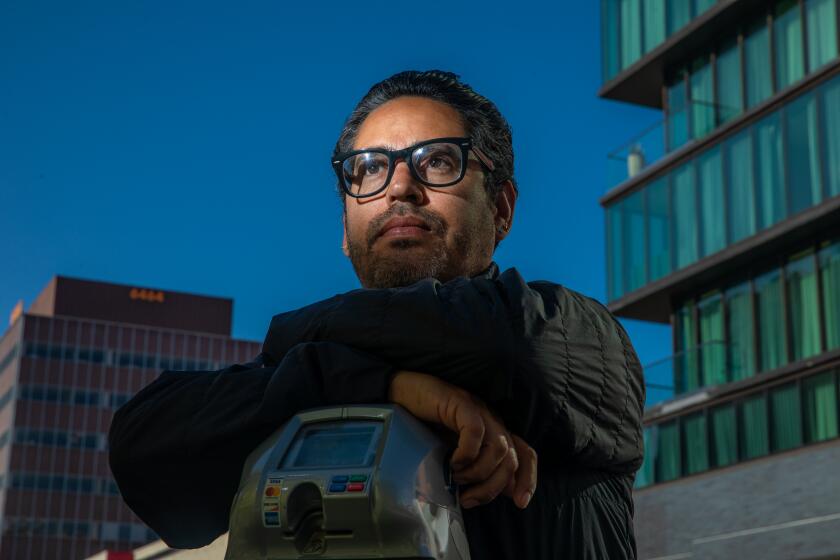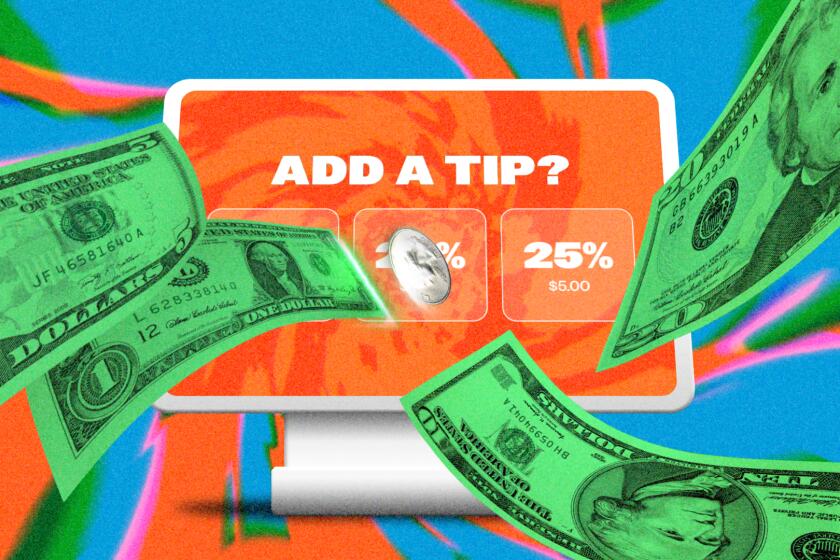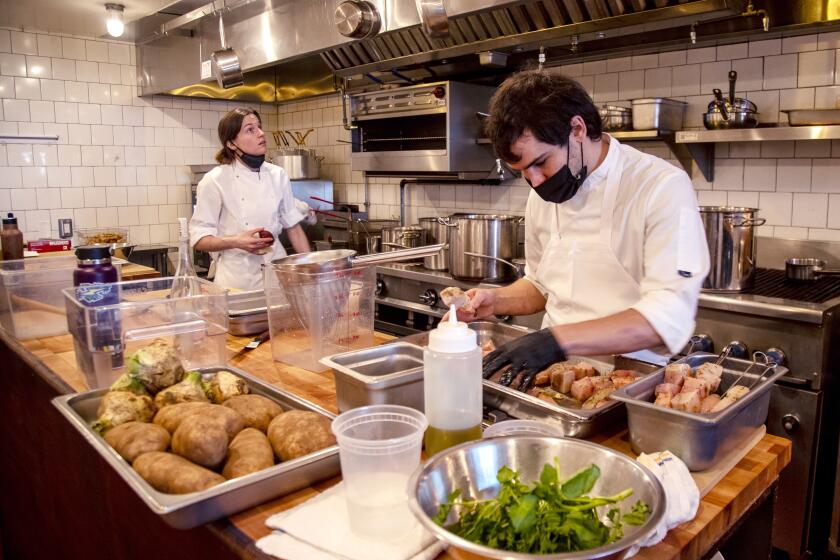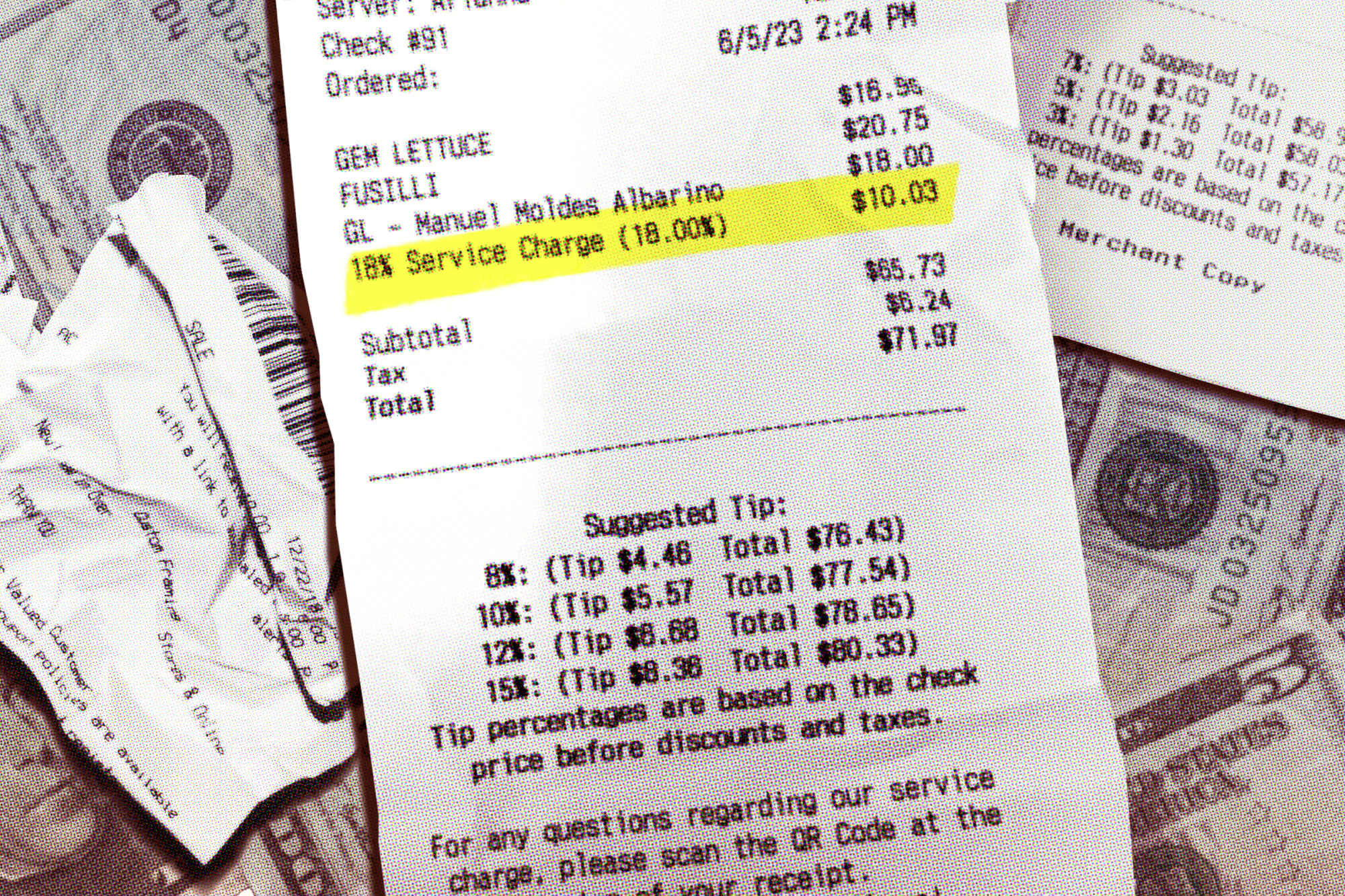
The restaurant says the 18% service fee attached to checks is part of a vision to make pay more equitable among all workers. The suit filed Tuesday in L.A. seeks damages for what servers claim are tips.
- Share via
At one point in 2021, Jasmine Sharma was so exasperated with her low tips at the Jon & Vinny’s restaurant in Fairfax that she learned to approach almost every diner with what she dubbed her “monologue.”
“Hi, all. Here is the check. Take your time, no rush at all.” She said she’d seek to explain an 18% service fee added to the check to each customer. “If you do want to leave an additional tip, it is more than appreciated, not required,” she would say.
Sometimes people would hear Sharma out. Other times they were too tipsy to listen. Often, she got a question: “What do you mean you’re not getting the tip?”
Sharma started her table-side performance when she noticed diners were leaving her less in tips for her service. The confusion about the 18% service fee, she said, generated an uproar among the servers, some of whom sent angry emails to upper management and agitated to meet with them for an explanation as to how the service fee was being allocated.
The L.A. city attorney is looking into a hospitality group that runs some of the trendiest restaurants in Hollywood over healthcare service fees tacked on to diners’ bills.
Sharma is part of a class-action lawsuit filed Tuesday in Los Angeles Superior Court against Joint Venture Restaurant Group, Inc., which owns Jon & Vinny’s. The workers claim that the company denied them tips and therefore shortchanged them on their take-home pay because of confusion resulting from the 18% service fee.
The practice of adding service charges to restaurant checks has grown in Southern California in recent years, and debates over how it should be treated by customers and workers gets to a fundamental question: Should every employee of a restaurant share in what customers pay for being served?
Tuesday’s lawsuit alleges that Jon & Vinny’s is in violation of California’s gratuity law, which requires that tips to be remitted in full to non-managerial service staff.
Through a spokesperson, the restaurant group — including partners Jon Shook, Vinny Dotolo and Helen Johannesen, well-known figures in the L.A. culinary community — denied the claims. The business partners said their service-charge model democratizes a dining staff’s earnings for everyone in their restaurant, and that customers are offered information that states the fee is not a tip.
“Ten years ago, we recognized that the traditional tip model rewarded some employees, but left many employees behind – creating a huge disparity where some employees did very well and others did not,” the group said in a statement. The service fee, it added, “not only unquestionably benefits hourly employees, but it is unquestionably legal, having been vetted by independent leading professionals in the hospitality industry.”
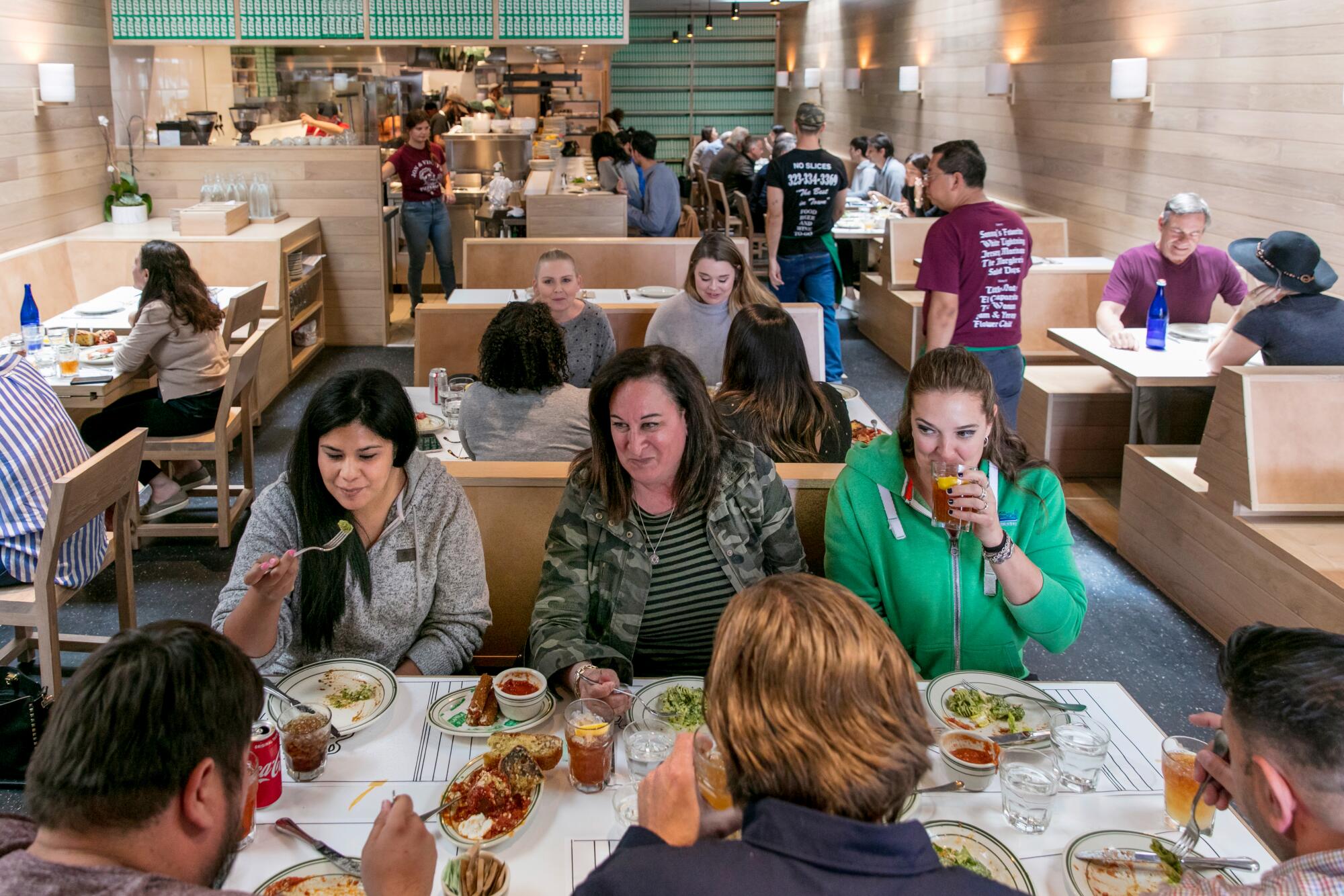
Jon & Vinny’s is a happening place.
Its original location on Fairfax Avenue opened in 2015, promising a casual yet buzzy atmosphere for pizzas, pastas and well-selected natural wines. The dining room often played 1990s hip-hop.
Pizzas at Jon & Vinny’s range from $13.75 to $23.75. A popular salad of gem lettuce, Calabrian chile dressing, Parmigiano and bread crumbs costs $16. The restaurant has since expanded to Brentwood and Beverly Hills. In 2019, Jon and Vinny’s opened an outpost at a former longtime Chinese restaurant on Slauson Avenue in View Park, a historically Black L.A. neighborhood.
The appeal is at least partly due to the two male chef-restaurateurs’ personalities, a cross between laid-back and rebellious “dudes.” The two have several partnerships with the film and television industry and starred in a reality show on the Food Network in 2007, called “Two Dudes Catering.” The restaurant group they co-founded joins a bevy of highly lauded establishments, including Son of a Gun, Cookbook Market, a full-service catering company called Carmelized Productions, and Helen’s Wines, named for Johannesen, as well as the recently closed Animal.
In March 2020, as societies locked down and indoor dining paused indefinitely, many more restaurants began turning to a model that was already gaining steam: attaching a service charge or service fee to checks, sometimes framed as a healthcare service charge for workers.
Such service fees have become a flashpoint for the restaurant and hospitality industries.
Workers who serve food and drinks typically rely on tips as part of their take-home wages. For diners, the fees have resulted in confusion, according to interviews and online accounts. Complaints and questions about the increasingly ubiquitous added charges regularly pop up on social media, such as Reddit, Instagram and Yelp.
After a story published May 16 about the city investigating Hollywood restaurants for allegedly keeping service fees from workers, The Times received multiple messages from current and former Jon & Vinny’s employees who complained about the restaurant chain’s service fee. This article is based on allegations in Tuesday’s suit and on interviews with more than a dozen current and former workers, several of whom declined to be named but offered matching accounts.
Jon & Vinny’s has been adding the service charges since it opened. Tensions were building for years over wages and tips at the restaurant, Sharma and multiple current and former workers said in interviews. Once the restaurant began adding suggested tips on the receipt of 3%, 5% and 7% — on top of the 18% service fee — in late 2021, some of the workers said they had had enough.
The service fee “reasonably appears to be a gratuity for the service staff,” according to the lawsuit. Because the service fee was 18% and workers customarily receive a similar amount in tips, customers assumed it was an automatic gratuity, the workers said, echoing claims in the lawsuit.

So should a service fee on a restaurant bill be considered a tip for the service rendered at the table or something else? Courts have so far ruled the distinction hinges on how clear the employer is regarding what the fee is for and how it will be distributed.
In California, courts have held that mandatory charges cannot be considered gratuities under the labor code. But that changed in 2019, when a state appeals court ruled that a service charge could be a “gratuity” that has to go to non-managerial employees if it could be established that the industry custom is to treat service charges as gratuities, as seen in the San Francisco case O’Grady vs. Merchant Exchange Productions Inc.
Anthony Zaller, an employment litigation attorney who has spent his career defending employers in the state, said that if an employer’s explanation would lead a reasonable customer to believe that the fees were going to the employee, then the fees should be treated as a gratuity, and all must be remitted to non-managerial waitstaff, according to the state’s case law.
“The clarity that the company is providing to the customer is going to make that determination,” Zaller said.
Free food, getting paid to post and hundreds of thousands of social followers. A look into the world of food influencers.
Jon & Vinny’s view is that its service-fee model is critical not only for its business but also for its culture.
“We can’t just focus on server pay; it would miss the point of the system we’re trying to create in moving to a more equitable environment for all our employees,” Johannesen said in an interview. “It’s hard as a transitional mind-set to see the direction and movement that we want to make for our entire team, all of our hourly employees. It’s actually something we really believe in, quite strongly.”
The 18% service fee business model, she said, is about bringing equity and sharing more of the notoriously narrow profit margin in the restaurant industry with everyone — including dishwashers, line cooks, servers and even the person who buys produce at the farmers market.
“That 18% is going to the hourly employee,” Johannesen said. “There are people who get up at 4 a.m. and make cookies ... people who roll dough. There are hourly employees that without them, what you experience at Jon & Vinny’s would not be what it is.”
The norms around whom, and how much, Americans tip have shifted in recent years — and consumers are increasingly confused.
The lawsuit against Jon & Vinny’s was filed by Shannon Liss-Riordan, a prominent employment attorney who’s known for tackling cases against ride-share app companies and hotels on behalf of workers. In April, she won a trial court decision related to service fees at a Marriott hotel in downtown San Francisco. The ruling would require Marriott to pay around $9 million in withheld service fees to staff who served food and drinks at banquets.
The case is still subject to appeal.
In Tuesday’s suit against Jon & Vinny’s, Liss-Riordan’s firm wrote: “When customers have paid these 18 percent service charges on Defendant’s bills, it is reasonable for them to have believed they were gratuities to be paid to the service staff, as that is customarily the percentage added as a gratuity or tip in the hospitality industry.”
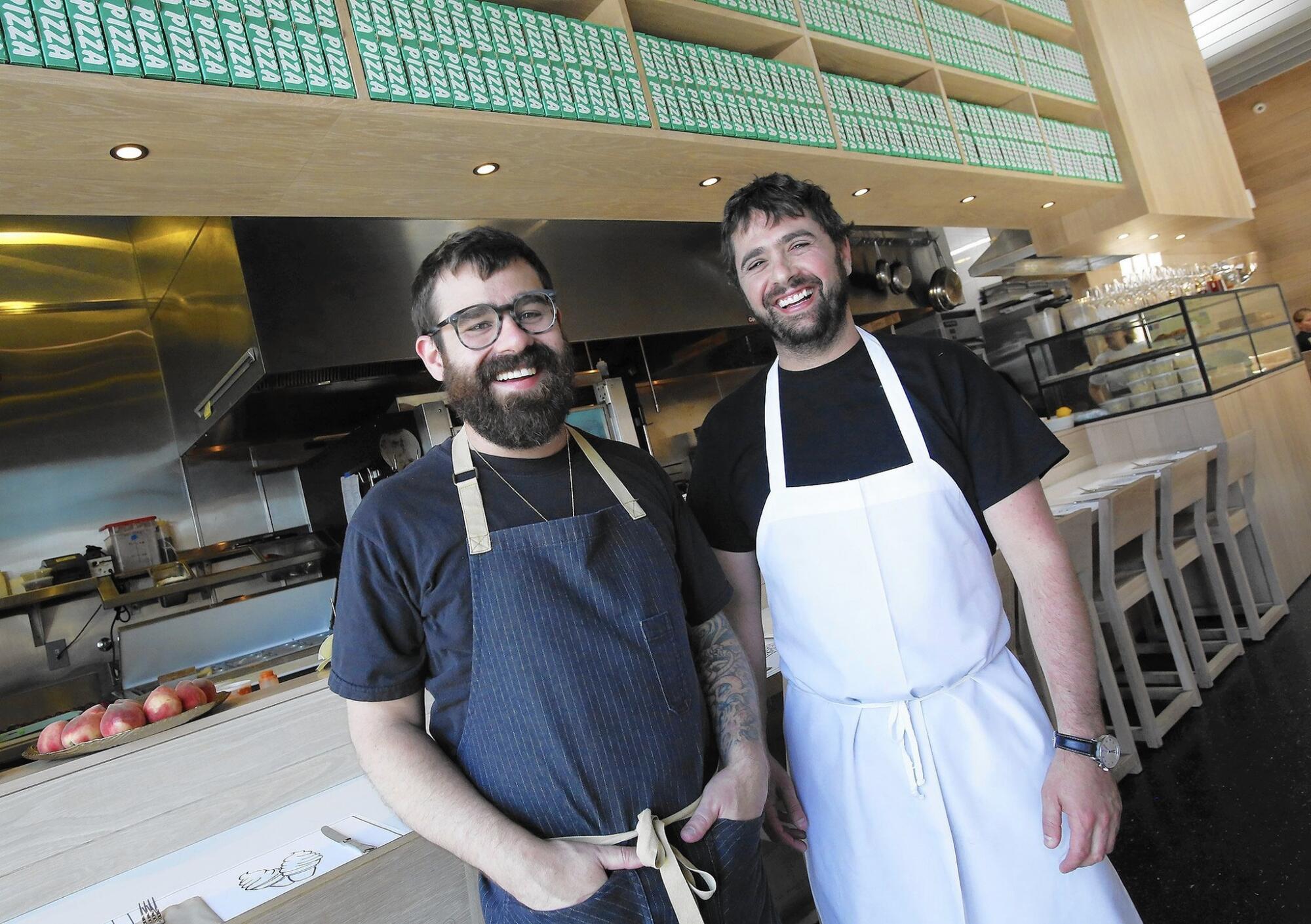

After days of asking to meet with Shook and Dotolo, about 20 to 30 employees gathered on Dec. 13, 2021, at the Fairfax Avenue restaurant. The meeting was taped by at least one person in attendance. That recording was played for the Los Angeles Times and corroborated with attendees’ accounts.
For the first 20 minutes, Shook, Dotolo and Johannesen spoke to their workers about the high costs of operating a restaurant and their overall mission for pay equity. They said they wanted to change the culture of the L.A. dining scene by leveling the playing field for restaurant workers, and provide a more equitable wage for everyone.
The service charge, the owners argued, was part of that vision.
“It goes into the overall total labor pool and then it is divvied up to make sure that our cooks make more than what is standard up the street. … It goes all the way across the board,” Shook is heard saying in the recording. “We have a somm [sommelier] that’s on salary. That’s all part of the labor pool.”
But some of the workers weren’t satisfied.
At one point, Shook said in the recording, “Technically, $15 an hour is the state living wage.”
An employee chimed in: “Living wage but not a livable wage. ... We’re living in L.A., and $15 is not a livable wage.”
In the days and weeks following the December 2021 meeting, several employees at the Fairfax location quit. The 18% service fee remained.
How is the Hollywood restaurant at the heart of the cat and divorce scandal managing as rumors swirl?
Since the service fee was implemented at Jon & Vinny’s, the language at the end of the receipt explaining the charge has shifted throughout the years, according to prior and current receipts obtained by The Times.
Some years, the fine print on the bottom of the receipt stated the 18% service fee was not a gratuity. Other years and as recently as last month, receipts at the Fairfax and Beverly Hills locations did not mention that the service fee was not a gratuity.
Instead, the receipt has a QR code, which if scanned links to a web page that says “What We Believe.” Customers are then told “No, the service charge is not a tip or gratuity, it is an added fee that is controlled by the restaurant.”
In a frequently asked questions section, Jon & Vinny’s responds to a query of “Why not just increase food prices?”
“At its core, the service charge is about driving change in our industry — helping ensure our business can thrive in challenging economic environments and compensating each member of our team in a more equitable way — in a way that uniformly increasing our food prices doesn’t allow for,” the page says.
Jesse Caryl, an attorney for Joint Venture Restaurant Group, said his client makes it clear to employees and diners that the service fee is not a tip.
“We go to great lengths to explain to customers to ensure there is no confusion,” he said. In addition, he said, there is a suggested gratuity line at the bottom of the receipt.

The Times reviewed payroll records from two Jon & Vinny’s locations, provided by the company, which showed that average base wages range from $17.72 per hour for dishwashers to $23.96 per hour for sommeliers, with hosts and servers making an average of $19.42 to $20.29 per hour, and cooks, bussers and baristas making between $18.50 and a little over $19.
On top of that base wage, Jon & Vinny’s employees still earn tips, which are pooled and split as in a typical restaurant between front- and back-of-house employees. Employees involved in fulfilling delivery orders also receive a bonus based on the fee earned from the delivery platform apps, and sommeliers earn a bonus based on wine sales.
As a result, servers earn the highest average hourly wages among staff, at just over $39 at one location and $42 at the other, while these tips and other bonuses bring dishwashers over $21.50 and $22, cooks up to $23 to $24, bussers and baristas to just over $25, hosts to over $29 at one location and over $34 at the other, and sommeliers to $38 to $40.
According to a review by the Times, the company’s payment and accounting system treats the service charge as a revenue line item on checks, and there is no way to directly track the flow of service charge revenue to payroll. Instead, the revenue functions just like revenue at any other business, contributing to total revenue, which is used to pay out payroll costs.
Since labor costs can be the largest chunk of any restaurant’s budget, the precise flow of revenue from the 18% service fee is sort of moot, the restaurant argues, because overall payroll is far greater than 18% of what it brings in.
Its service charge system allows the restaurant to increase wages for its hourly employees, including for workers who are not present in-house during service hours — and none of it went to management or salaried employee payroll, the restaurant said.
Shannon Liss-Riordan made a name for herself defending workers against FedEx, American Airlines and Starbucks in wage and hour lawsuits.
Vaguely written?
The language on receipts at Jon & Vinny’s locations have varied throughout the years.
Liss-Riordan said the notion that customers click through a QR code to learn the specifics of the charge is unrealistic.
“How many customers would actually look at the QR code and how many customers would actually scroll down and look at that and understand that?” Liss-Riordan said. “When a reasonable customer sees an 18% service charge on a food and beverage bill, they are going to think that is a gratuity for the staff.”
In an interview, Johannesen said she can’t assume what customers believe.
However, she said, the QR code was an effort to be more transparent about the fee. She said they don’t mention it specifically on the receipt because customers had complained about how long the receipts had become with language about the service fee.
High service fees — north of 15% — aren’t unusual and are normally used as an automatic gratuity, said Janet Lowder, president of Restaurant Management Services in Rancho Palos Verdes. But Lowder and other experts said it was unusual for such high service fees to supplement base hourly wages.
“That just doesn’t seem right,” Lowder said. “It’s bizarre that it’s used to offset the hourly wages, which is the cost of doing business.”
Lowder, who has worked in the restaurant industry for more than 30 years, said she can see how tension would build in a restaurant, where servers would feel aggrieved by a new business model that disrupts the amount of tips they take home.
Johannesen said she strongly believes in and stands by the service-fee model. She said that it can be hard for some to understand it because it is different from the classic restaurant setup where servers work mostly for tips. “It’s a different way of thinking of the ecosystem and health of a restaurant,” she said.
Most former Jon & Vinny’s employees who complained about the restaurant’s high service fee were people who worked as servers to supplement their livelihood in the entertainment industry. Several didn’t want to give their names, fearful of repercussions.
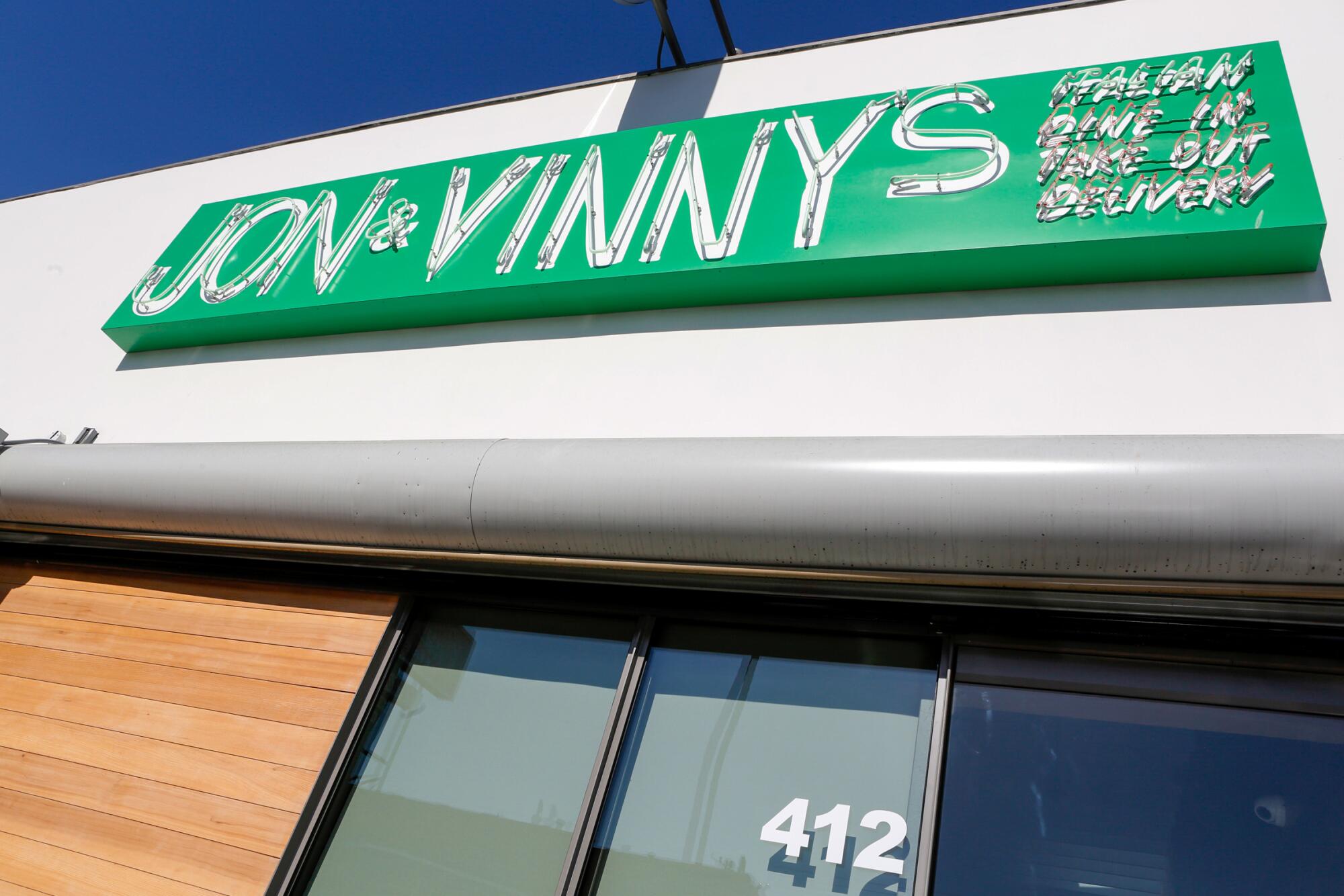
Kara Jobe, a former server at the Beverly Hills location who also is an actor, said normally diners didn’t ask about the fee and didn’t leave a tip. Every so often, a diner would ask about it.
“Does this go to you?” diners asked.
“I don’t really know,” she’d respond. “I’m told it goes to my hourly wage.”
Often, she said, diners became upset.
“I mean, how do you tell someone: I need you to pay my hourly wage but then I need you to tip on top of that because we don’t get enough money from our hourly wage. As a guest at Jon & Vinny’s, I need you to basically have all the responsibility for paying me,” Jobe said.
Jobe left her job in late May because she said the resentment built to an intolerable level.
Gary Alleyne, a line cook at Jon & Vinny’s in Beverly Hills, spoke with The Times at the suggestion of Jon & Vinny’s management. He said the 18% service fee helps him make a few dollars above minimum wage. The 32-year-old said he’s worked for the company for most of the last seven years and is happy with his compensation.
The 18% service fee, Alleyne said, “helps us get paid more than we usually get paid like at any other type of restaurant. A little bit higher wages.”
He said he makes $20 base hourly wage an hour and about $21 to $22 gross an hour after tips and delivery fees.
Alleyne said he works about 34 hours a week and gets paid about $50,000 a year. Between his main job as a line cook at Jon & Vinny’s and other side jobs, Alleyne said he’s doing all right. “I’m able to sustain myself,” Alleyne said. “You always got to hustle in L.A., you feel me?”
Alleyne said he wasn’t told about the 18% service fee when he was first hired in 2016. He said he found out about the fee a few months after working there when he saw it on a bill.
He said he thought the money from the fee went to the servers but later discovered it went to him too. Alleyne later added that the 18% service fee was in an employee handbook that he hadn’t looked at closely.

Jordan Slaffey, a former server who worked at the Slauson and Beverly Hills locations of Jon & Vinny’s for a year and a half, said she would observe that customers were confused about the service fee on their check and left very little tip or nothing.
Slaffey, who is also part of the lawsuit, said on several occasions she asked for a manager to show her where all the 18% was going to. “It doesn’t add up,” she said of the fee. “It doesn’t make sense.”
Slaffey stayed as long as she did because she needed the job. She said she was living paycheck-to-paycheck. “I really believed in Jon & Vinny’s,” Slaffey said recently, shaking her head with disappointment.
About a week before her last day, she said she served Shook at Jon & Vinny’s in Beverly Hills. He showed up with a man and ordered zucchini spaghetti and pizza. It appeared to be a business meeting, she said.
After the meal, she said, Shook didn’t leave a tip.
In response, the restaurant group provided multiple checks showing Jon & Vinny’s partners leaving tips for service. “When Jon, Vinny and Helen are there in a personal capacity they always tip,” a spokesperson said.
Times staff writer Sam Dean contributed to this report.

More to Read
Eat your way across L.A.
Get our weekly Tasting Notes newsletter for reviews, news and more.
You may occasionally receive promotional content from the Los Angeles Times.
